Learning Theories, Communication Models & Inclusive Assessment
VerifiedAdded on 2023/06/12
|21
|6659
|480
Report
AI Summary
This report delves into various learning theories, including classical conditioning and social learning theory, and their application in teaching. It emphasizes the importance of considering individual learning preferences for inclusive teaching and assessment, highlighting how understanding learner weaknesses and strengths can lead to improved learning outcomes. The report also discusses communication models and principles crucial for effective teaching, learning, and assessment, particularly in English. Furthermore, it includes examples of assessments that foster learning and relationships, personal learning experiences in curriculum research, and reflective accounts on theories and models of reflection and evaluation, providing a comprehensive overview of effective pedagogical practices. Desklib provides this document and many more to aid students in their academic journey.
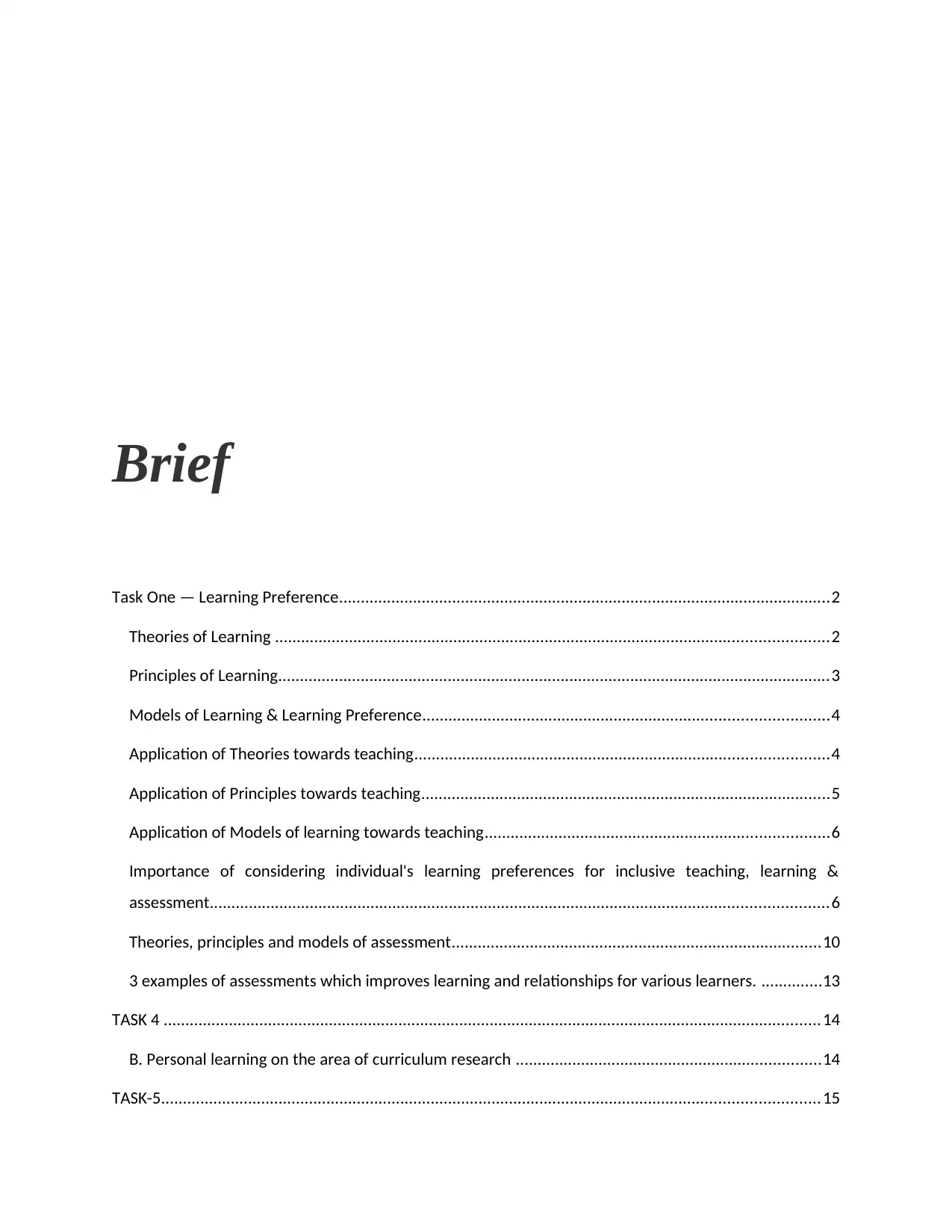
Brief
Task One — Learning Preference.................................................................................................................2
Theories of Learning ...............................................................................................................................2
Principles of Learning...............................................................................................................................3
Models of Learning & Learning Preference.............................................................................................4
Application of Theories towards teaching...............................................................................................4
Application of Principles towards teaching..............................................................................................5
Application of Models of learning towards teaching...............................................................................6
Importance of considering individual's learning preferences for inclusive teaching, learning &
assessment..............................................................................................................................................6
Theories, principles and models of assessment.....................................................................................10
3 examples of assessments which improves learning and relationships for various learners. ..............13
TASK 4 .......................................................................................................................................................14
B. Personal learning on the area of curriculum research ......................................................................14
TASK-5.......................................................................................................................................................15
Task One — Learning Preference.................................................................................................................2
Theories of Learning ...............................................................................................................................2
Principles of Learning...............................................................................................................................3
Models of Learning & Learning Preference.............................................................................................4
Application of Theories towards teaching...............................................................................................4
Application of Principles towards teaching..............................................................................................5
Application of Models of learning towards teaching...............................................................................6
Importance of considering individual's learning preferences for inclusive teaching, learning &
assessment..............................................................................................................................................6
Theories, principles and models of assessment.....................................................................................10
3 examples of assessments which improves learning and relationships for various learners. ..............13
TASK 4 .......................................................................................................................................................14
B. Personal learning on the area of curriculum research ......................................................................14
TASK-5.......................................................................................................................................................15
Paraphrase This Document
Need a fresh take? Get an instant paraphrase of this document with our AI Paraphraser
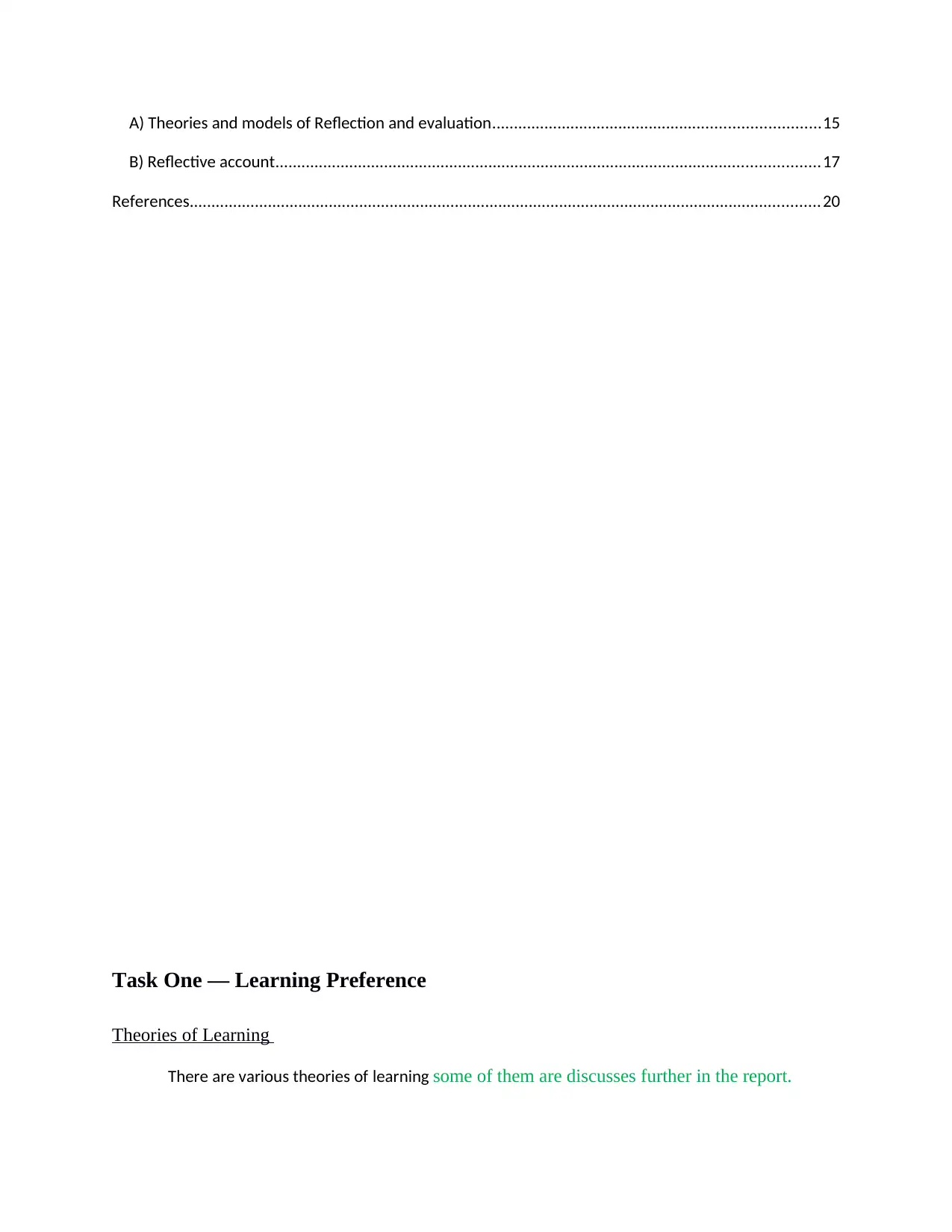
A) Theories and models of Reflection and evaluation...........................................................................15
B) Reflective account.............................................................................................................................17
References.................................................................................................................................................20
Task One — Learning Preference
Theories of Learning
There are various theories of learning some of them are discusses further in the report.
B) Reflective account.............................................................................................................................17
References.................................................................................................................................................20
Task One — Learning Preference
Theories of Learning
There are various theories of learning some of them are discusses further in the report.
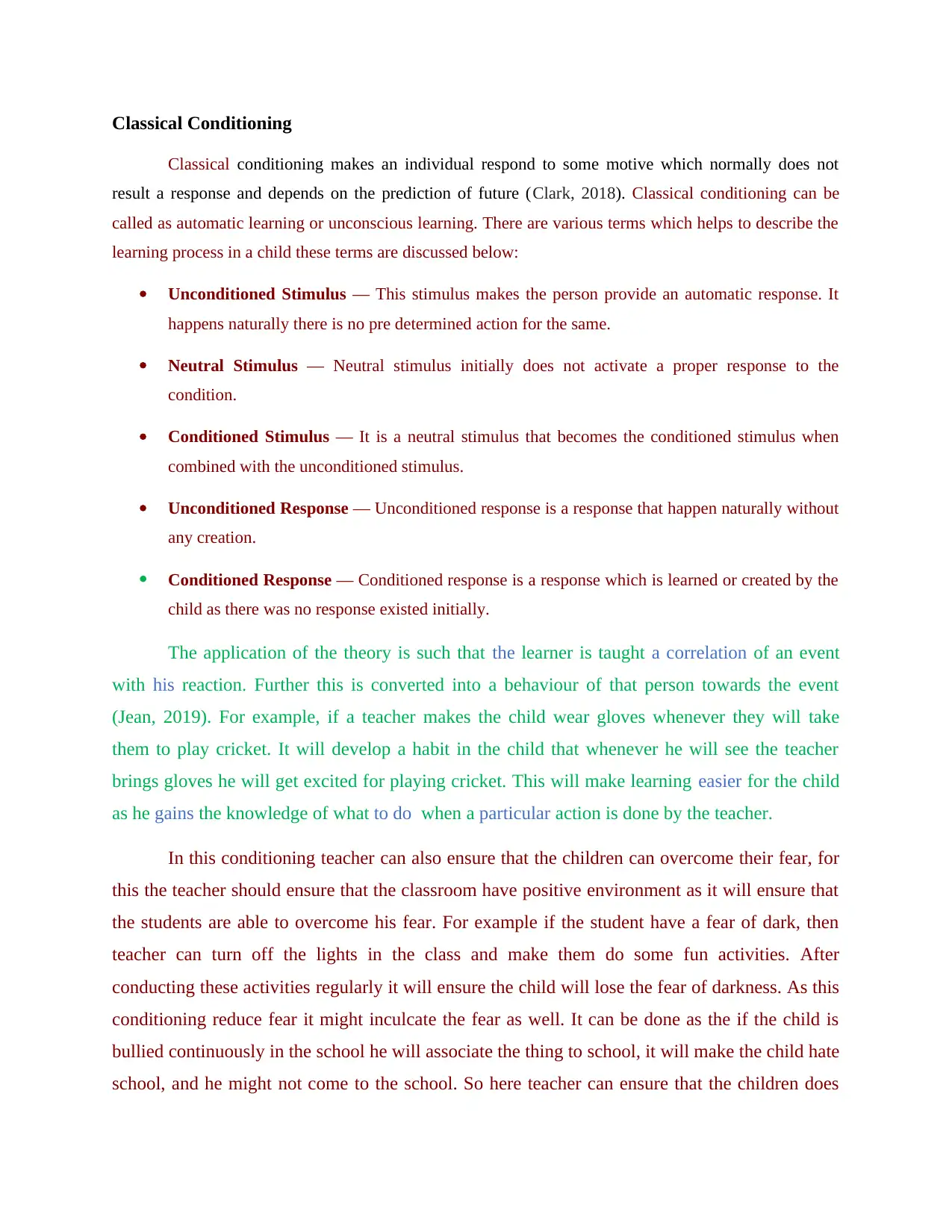
Classical Conditioning
Classical conditioning makes an individual respond to some motive which normally does not
result a response and depends on the prediction of future (Clark, 2018). Classical conditioning can be
called as automatic learning or unconscious learning. There are various terms which helps to describe the
learning process in a child these terms are discussed below:
Unconditioned Stimulus — This stimulus makes the person provide an automatic response. It
happens naturally there is no pre determined action for the same.
Neutral Stimulus — Neutral stimulus initially does not activate a proper response to the
condition.
Conditioned Stimulus — It is a neutral stimulus that becomes the conditioned stimulus when
combined with the unconditioned stimulus.
Unconditioned Response — Unconditioned response is a response that happen naturally without
any creation.
Conditioned Response — Conditioned response is a response which is learned or created by the
child as there was no response existed initially.
The application of the theory is such that the learner is taught a correlation of an event
with his reaction. Further this is converted into a behaviour of that person towards the event
(Jean, 2019). For example, if a teacher makes the child wear gloves whenever they will take
them to play cricket. It will develop a habit in the child that whenever he will see the teacher
brings gloves he will get excited for playing cricket. This will make learning easier for the child
as he gains the knowledge of what to do when a particular action is done by the teacher.
In this conditioning teacher can also ensure that the children can overcome their fear, for
this the teacher should ensure that the classroom have positive environment as it will ensure that
the students are able to overcome his fear. For example if the student have a fear of dark, then
teacher can turn off the lights in the class and make them do some fun activities. After
conducting these activities regularly it will ensure the child will lose the fear of darkness. As this
conditioning reduce fear it might inculcate the fear as well. It can be done as the if the child is
bullied continuously in the school he will associate the thing to school, it will make the child hate
school, and he might not come to the school. So here teacher can ensure that the children does
Classical conditioning makes an individual respond to some motive which normally does not
result a response and depends on the prediction of future (Clark, 2018). Classical conditioning can be
called as automatic learning or unconscious learning. There are various terms which helps to describe the
learning process in a child these terms are discussed below:
Unconditioned Stimulus — This stimulus makes the person provide an automatic response. It
happens naturally there is no pre determined action for the same.
Neutral Stimulus — Neutral stimulus initially does not activate a proper response to the
condition.
Conditioned Stimulus — It is a neutral stimulus that becomes the conditioned stimulus when
combined with the unconditioned stimulus.
Unconditioned Response — Unconditioned response is a response that happen naturally without
any creation.
Conditioned Response — Conditioned response is a response which is learned or created by the
child as there was no response existed initially.
The application of the theory is such that the learner is taught a correlation of an event
with his reaction. Further this is converted into a behaviour of that person towards the event
(Jean, 2019). For example, if a teacher makes the child wear gloves whenever they will take
them to play cricket. It will develop a habit in the child that whenever he will see the teacher
brings gloves he will get excited for playing cricket. This will make learning easier for the child
as he gains the knowledge of what to do when a particular action is done by the teacher.
In this conditioning teacher can also ensure that the children can overcome their fear, for
this the teacher should ensure that the classroom have positive environment as it will ensure that
the students are able to overcome his fear. For example if the student have a fear of dark, then
teacher can turn off the lights in the class and make them do some fun activities. After
conducting these activities regularly it will ensure the child will lose the fear of darkness. As this
conditioning reduce fear it might inculcate the fear as well. It can be done as the if the child is
bullied continuously in the school he will associate the thing to school, it will make the child hate
school, and he might not come to the school. So here teacher can ensure that the children does
⊘ This is a preview!⊘
Do you want full access?
Subscribe today to unlock all pages.

Trusted by 1+ million students worldwide
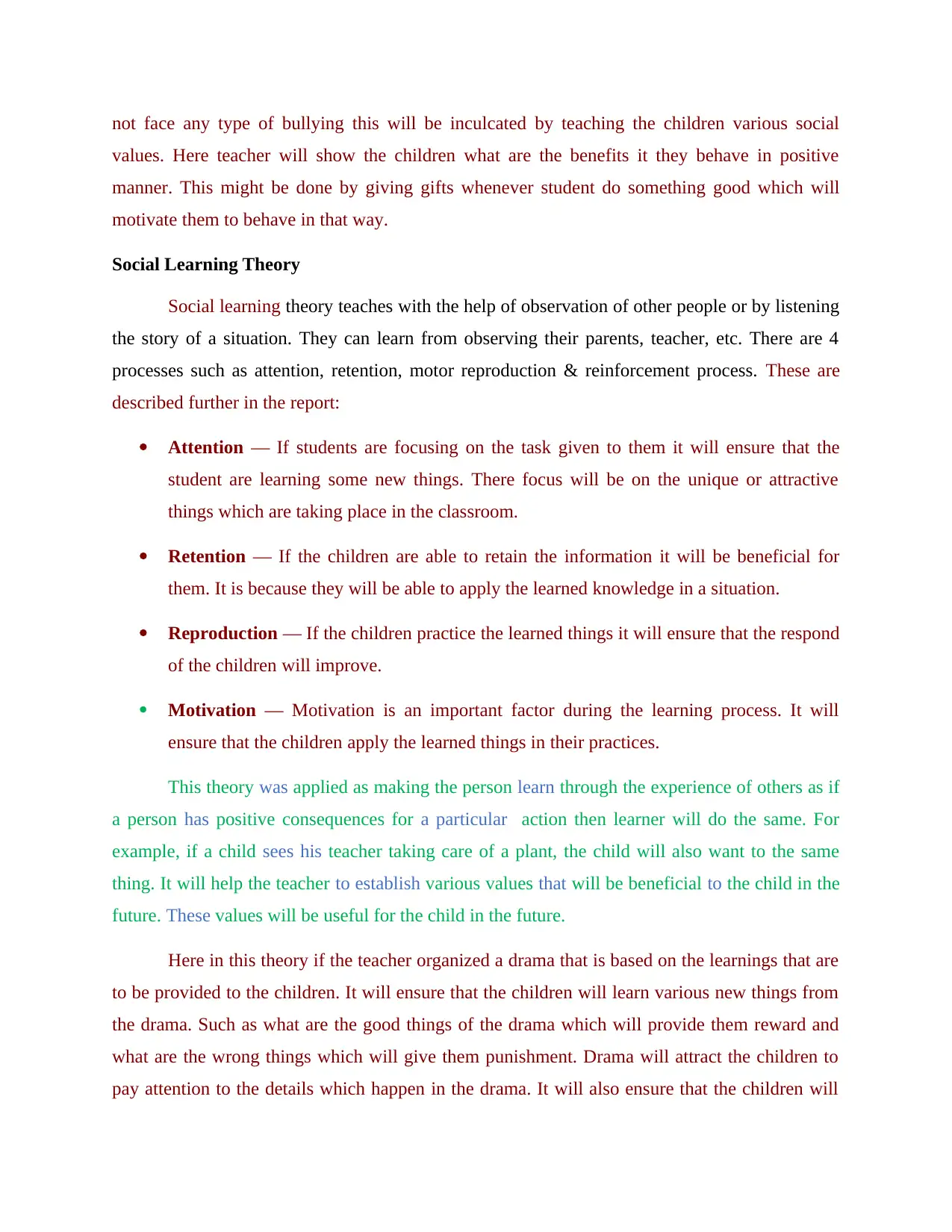
not face any type of bullying this will be inculcated by teaching the children various social
values. Here teacher will show the children what are the benefits it they behave in positive
manner. This might be done by giving gifts whenever student do something good which will
motivate them to behave in that way.
Social Learning Theory
Social learning theory teaches with the help of observation of other people or by listening
the story of a situation. They can learn from observing their parents, teacher, etc. There are 4
processes such as attention, retention, motor reproduction & reinforcement process. These are
described further in the report:
Attention — If students are focusing on the task given to them it will ensure that the
student are learning some new things. There focus will be on the unique or attractive
things which are taking place in the classroom.
Retention — If the children are able to retain the information it will be beneficial for
them. It is because they will be able to apply the learned knowledge in a situation.
Reproduction — If the children practice the learned things it will ensure that the respond
of the children will improve.
Motivation — Motivation is an important factor during the learning process. It will
ensure that the children apply the learned things in their practices.
This theory was applied as making the person learn through the experience of others as if
a person has positive consequences for a particular action then learner will do the same. For
example, if a child sees his teacher taking care of a plant, the child will also want to the same
thing. It will help the teacher to establish various values that will be beneficial to the child in the
future. These values will be useful for the child in the future.
Here in this theory if the teacher organized a drama that is based on the learnings that are
to be provided to the children. It will ensure that the children will learn various new things from
the drama. Such as what are the good things of the drama which will provide them reward and
what are the wrong things which will give them punishment. Drama will attract the children to
pay attention to the details which happen in the drama. It will also ensure that the children will
values. Here teacher will show the children what are the benefits it they behave in positive
manner. This might be done by giving gifts whenever student do something good which will
motivate them to behave in that way.
Social Learning Theory
Social learning theory teaches with the help of observation of other people or by listening
the story of a situation. They can learn from observing their parents, teacher, etc. There are 4
processes such as attention, retention, motor reproduction & reinforcement process. These are
described further in the report:
Attention — If students are focusing on the task given to them it will ensure that the
student are learning some new things. There focus will be on the unique or attractive
things which are taking place in the classroom.
Retention — If the children are able to retain the information it will be beneficial for
them. It is because they will be able to apply the learned knowledge in a situation.
Reproduction — If the children practice the learned things it will ensure that the respond
of the children will improve.
Motivation — Motivation is an important factor during the learning process. It will
ensure that the children apply the learned things in their practices.
This theory was applied as making the person learn through the experience of others as if
a person has positive consequences for a particular action then learner will do the same. For
example, if a child sees his teacher taking care of a plant, the child will also want to the same
thing. It will help the teacher to establish various values that will be beneficial to the child in the
future. These values will be useful for the child in the future.
Here in this theory if the teacher organized a drama that is based on the learnings that are
to be provided to the children. It will ensure that the children will learn various new things from
the drama. Such as what are the good things of the drama which will provide them reward and
what are the wrong things which will give them punishment. Drama will attract the children to
pay attention to the details which happen in the drama. It will also ensure that the children will
Paraphrase This Document
Need a fresh take? Get an instant paraphrase of this document with our AI Paraphraser
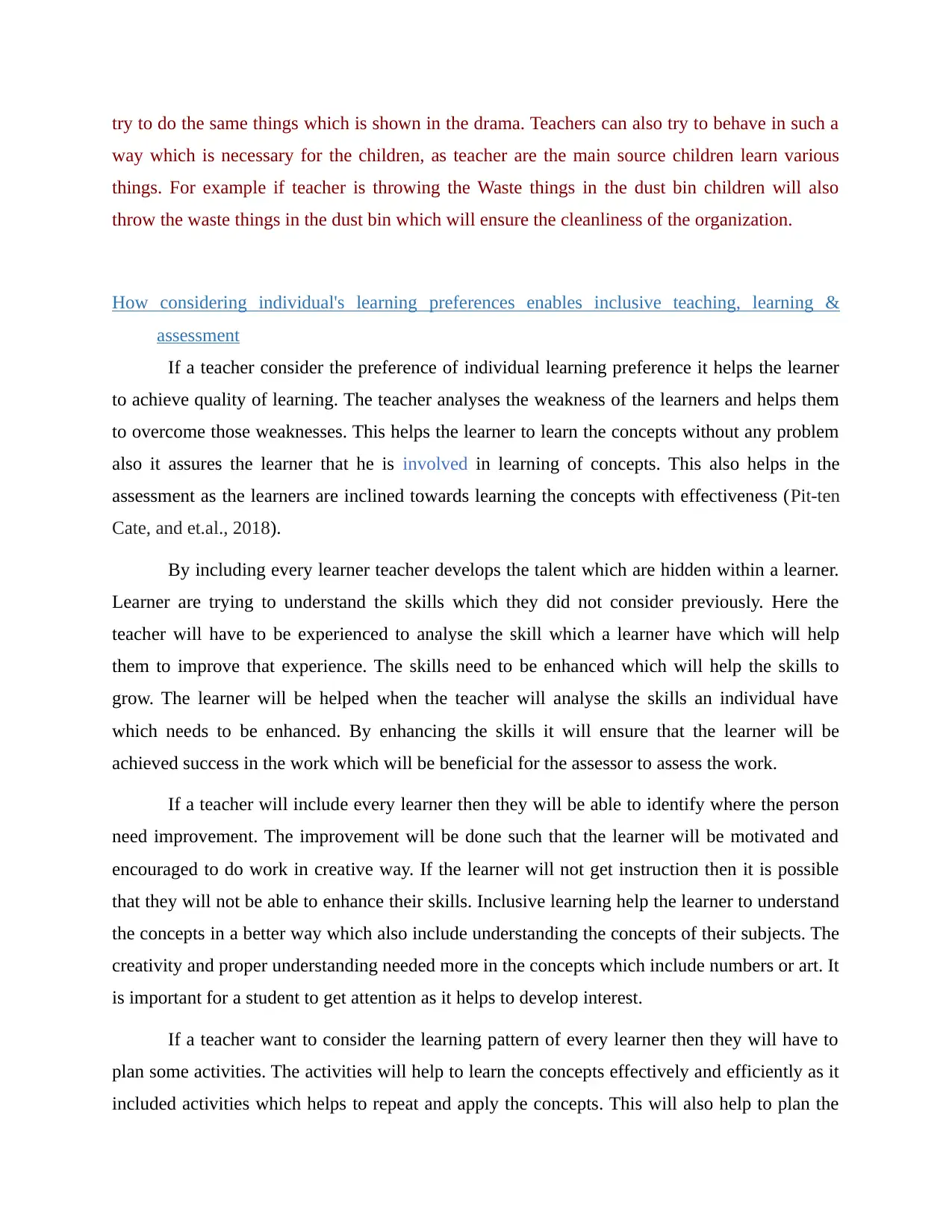
try to do the same things which is shown in the drama. Teachers can also try to behave in such a
way which is necessary for the children, as teacher are the main source children learn various
things. For example if teacher is throwing the Waste things in the dust bin children will also
throw the waste things in the dust bin which will ensure the cleanliness of the organization.
How considering individual's learning preferences enables inclusive teaching, learning &
assessment
If a teacher consider the preference of individual learning preference it helps the learner
to achieve quality of learning. The teacher analyses the weakness of the learners and helps them
to overcome those weaknesses. This helps the learner to learn the concepts without any problem
also it assures the learner that he is involved in learning of concepts. This also helps in the
assessment as the learners are inclined towards learning the concepts with effectiveness (Pit-ten
Cate, and et.al., 2018).
By including every learner teacher develops the talent which are hidden within a learner.
Learner are trying to understand the skills which they did not consider previously. Here the
teacher will have to be experienced to analyse the skill which a learner have which will help
them to improve that experience. The skills need to be enhanced which will help the skills to
grow. The learner will be helped when the teacher will analyse the skills an individual have
which needs to be enhanced. By enhancing the skills it will ensure that the learner will be
achieved success in the work which will be beneficial for the assessor to assess the work.
If a teacher will include every learner then they will be able to identify where the person
need improvement. The improvement will be done such that the learner will be motivated and
encouraged to do work in creative way. If the learner will not get instruction then it is possible
that they will not be able to enhance their skills. Inclusive learning help the learner to understand
the concepts in a better way which also include understanding the concepts of their subjects. The
creativity and proper understanding needed more in the concepts which include numbers or art. It
is important for a student to get attention as it helps to develop interest.
If a teacher want to consider the learning pattern of every learner then they will have to
plan some activities. The activities will help to learn the concepts effectively and efficiently as it
included activities which helps to repeat and apply the concepts. This will also help to plan the
way which is necessary for the children, as teacher are the main source children learn various
things. For example if teacher is throwing the Waste things in the dust bin children will also
throw the waste things in the dust bin which will ensure the cleanliness of the organization.
How considering individual's learning preferences enables inclusive teaching, learning &
assessment
If a teacher consider the preference of individual learning preference it helps the learner
to achieve quality of learning. The teacher analyses the weakness of the learners and helps them
to overcome those weaknesses. This helps the learner to learn the concepts without any problem
also it assures the learner that he is involved in learning of concepts. This also helps in the
assessment as the learners are inclined towards learning the concepts with effectiveness (Pit-ten
Cate, and et.al., 2018).
By including every learner teacher develops the talent which are hidden within a learner.
Learner are trying to understand the skills which they did not consider previously. Here the
teacher will have to be experienced to analyse the skill which a learner have which will help
them to improve that experience. The skills need to be enhanced which will help the skills to
grow. The learner will be helped when the teacher will analyse the skills an individual have
which needs to be enhanced. By enhancing the skills it will ensure that the learner will be
achieved success in the work which will be beneficial for the assessor to assess the work.
If a teacher will include every learner then they will be able to identify where the person
need improvement. The improvement will be done such that the learner will be motivated and
encouraged to do work in creative way. If the learner will not get instruction then it is possible
that they will not be able to enhance their skills. Inclusive learning help the learner to understand
the concepts in a better way which also include understanding the concepts of their subjects. The
creativity and proper understanding needed more in the concepts which include numbers or art. It
is important for a student to get attention as it helps to develop interest.
If a teacher want to consider the learning pattern of every learner then they will have to
plan some activities. The activities will help to learn the concepts effectively and efficiently as it
included activities which helps to repeat and apply the concepts. This will also help to plan the
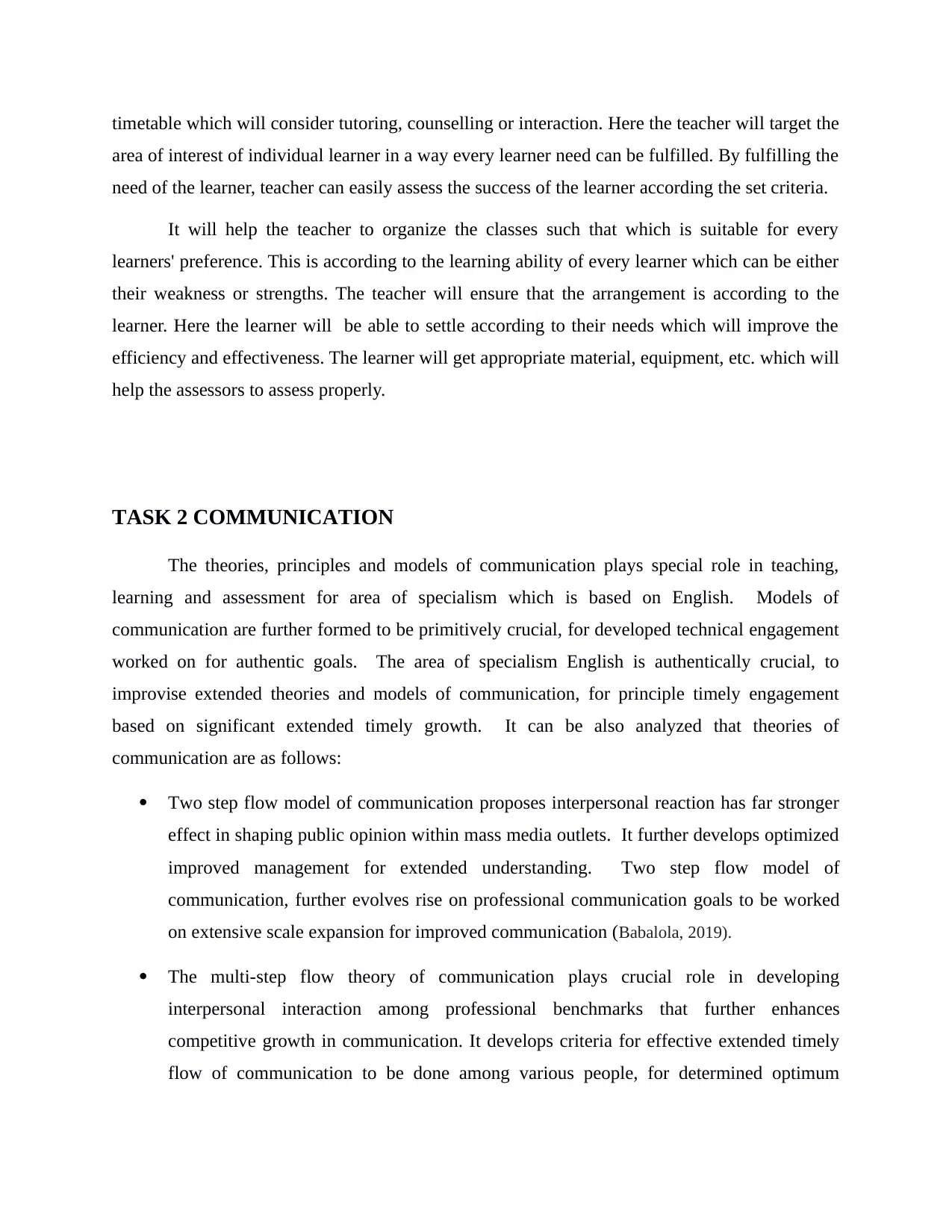
timetable which will consider tutoring, counselling or interaction. Here the teacher will target the
area of interest of individual learner in a way every learner need can be fulfilled. By fulfilling the
need of the learner, teacher can easily assess the success of the learner according the set criteria.
It will help the teacher to organize the classes such that which is suitable for every
learners' preference. This is according to the learning ability of every learner which can be either
their weakness or strengths. The teacher will ensure that the arrangement is according to the
learner. Here the learner will be able to settle according to their needs which will improve the
efficiency and effectiveness. The learner will get appropriate material, equipment, etc. which will
help the assessors to assess properly.
TASK 2 COMMUNICATION
The theories, principles and models of communication plays special role in teaching,
learning and assessment for area of specialism which is based on English. Models of
communication are further formed to be primitively crucial, for developed technical engagement
worked on for authentic goals. The area of specialism English is authentically crucial, to
improvise extended theories and models of communication, for principle timely engagement
based on significant extended timely growth. It can be also analyzed that theories of
communication are as follows:
Two step flow model of communication proposes interpersonal reaction has far stronger
effect in shaping public opinion within mass media outlets. It further develops optimized
improved management for extended understanding. Two step flow model of
communication, further evolves rise on professional communication goals to be worked
on extensive scale expansion for improved communication (Babalola, 2019).
The multi-step flow theory of communication plays crucial role in developing
interpersonal interaction among professional benchmarks that further enhances
competitive growth in communication. It develops criteria for effective extended timely
flow of communication to be done among various people, for determined optimum
area of interest of individual learner in a way every learner need can be fulfilled. By fulfilling the
need of the learner, teacher can easily assess the success of the learner according the set criteria.
It will help the teacher to organize the classes such that which is suitable for every
learners' preference. This is according to the learning ability of every learner which can be either
their weakness or strengths. The teacher will ensure that the arrangement is according to the
learner. Here the learner will be able to settle according to their needs which will improve the
efficiency and effectiveness. The learner will get appropriate material, equipment, etc. which will
help the assessors to assess properly.
TASK 2 COMMUNICATION
The theories, principles and models of communication plays special role in teaching,
learning and assessment for area of specialism which is based on English. Models of
communication are further formed to be primitively crucial, for developed technical engagement
worked on for authentic goals. The area of specialism English is authentically crucial, to
improvise extended theories and models of communication, for principle timely engagement
based on significant extended timely growth. It can be also analyzed that theories of
communication are as follows:
Two step flow model of communication proposes interpersonal reaction has far stronger
effect in shaping public opinion within mass media outlets. It further develops optimized
improved management for extended understanding. Two step flow model of
communication, further evolves rise on professional communication goals to be worked
on extensive scale expansion for improved communication (Babalola, 2019).
The multi-step flow theory of communication plays crucial role in developing
interpersonal interaction among professional benchmarks that further enhances
competitive growth in communication. It develops criteria for effective extended timely
flow of communication to be done among various people, for determined optimum
⊘ This is a preview!⊘
Do you want full access?
Subscribe today to unlock all pages.

Trusted by 1+ million students worldwide
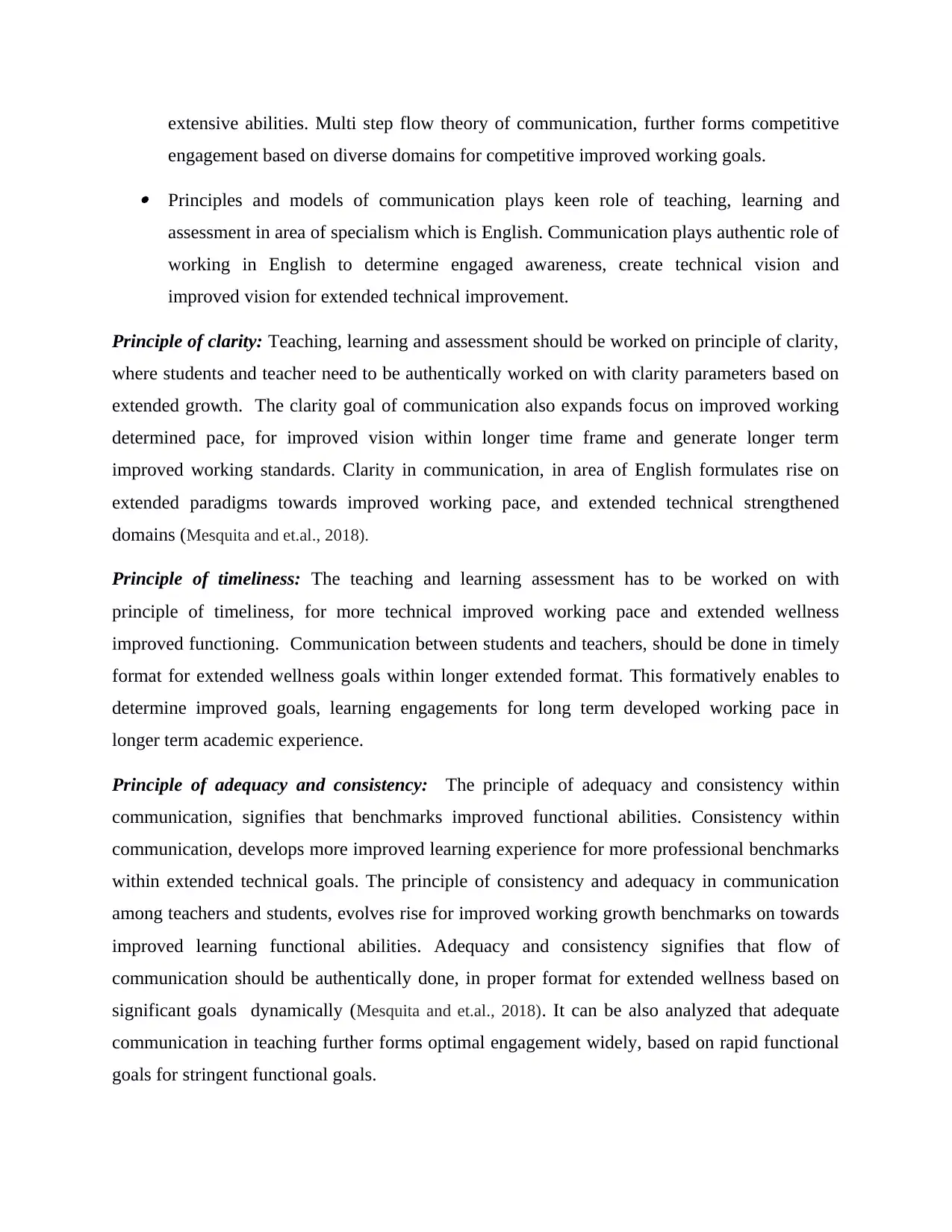
extensive abilities. Multi step flow theory of communication, further forms competitive
engagement based on diverse domains for competitive improved working goals. Principles and models of communication plays keen role of teaching, learning and
assessment in area of specialism which is English. Communication plays authentic role of
working in English to determine engaged awareness, create technical vision and
improved vision for extended technical improvement.
Principle of clarity: Teaching, learning and assessment should be worked on principle of clarity,
where students and teacher need to be authentically worked on with clarity parameters based on
extended growth. The clarity goal of communication also expands focus on improved working
determined pace, for improved vision within longer time frame and generate longer term
improved working standards. Clarity in communication, in area of English formulates rise on
extended paradigms towards improved working pace, and extended technical strengthened
domains (Mesquita and et.al., 2018).
Principle of timeliness: The teaching and learning assessment has to be worked on with
principle of timeliness, for more technical improved working pace and extended wellness
improved functioning. Communication between students and teachers, should be done in timely
format for extended wellness goals within longer extended format. This formatively enables to
determine improved goals, learning engagements for long term developed working pace in
longer term academic experience.
Principle of adequacy and consistency: The principle of adequacy and consistency within
communication, signifies that benchmarks improved functional abilities. Consistency within
communication, develops more improved learning experience for more professional benchmarks
within extended technical goals. The principle of consistency and adequacy in communication
among teachers and students, evolves rise for improved working growth benchmarks on towards
improved learning functional abilities. Adequacy and consistency signifies that flow of
communication should be authentically done, in proper format for extended wellness based on
significant goals dynamically (Mesquita and et.al., 2018). It can be also analyzed that adequate
communication in teaching further forms optimal engagement widely, based on rapid functional
goals for stringent functional goals.
engagement based on diverse domains for competitive improved working goals. Principles and models of communication plays keen role of teaching, learning and
assessment in area of specialism which is English. Communication plays authentic role of
working in English to determine engaged awareness, create technical vision and
improved vision for extended technical improvement.
Principle of clarity: Teaching, learning and assessment should be worked on principle of clarity,
where students and teacher need to be authentically worked on with clarity parameters based on
extended growth. The clarity goal of communication also expands focus on improved working
determined pace, for improved vision within longer time frame and generate longer term
improved working standards. Clarity in communication, in area of English formulates rise on
extended paradigms towards improved working pace, and extended technical strengthened
domains (Mesquita and et.al., 2018).
Principle of timeliness: The teaching and learning assessment has to be worked on with
principle of timeliness, for more technical improved working pace and extended wellness
improved functioning. Communication between students and teachers, should be done in timely
format for extended wellness goals within longer extended format. This formatively enables to
determine improved goals, learning engagements for long term developed working pace in
longer term academic experience.
Principle of adequacy and consistency: The principle of adequacy and consistency within
communication, signifies that benchmarks improved functional abilities. Consistency within
communication, develops more improved learning experience for more professional benchmarks
within extended technical goals. The principle of consistency and adequacy in communication
among teachers and students, evolves rise for improved working growth benchmarks on towards
improved learning functional abilities. Adequacy and consistency signifies that flow of
communication should be authentically done, in proper format for extended wellness based on
significant goals dynamically (Mesquita and et.al., 2018). It can be also analyzed that adequate
communication in teaching further forms optimal engagement widely, based on rapid functional
goals for stringent functional goals.
Paraphrase This Document
Need a fresh take? Get an instant paraphrase of this document with our AI Paraphraser
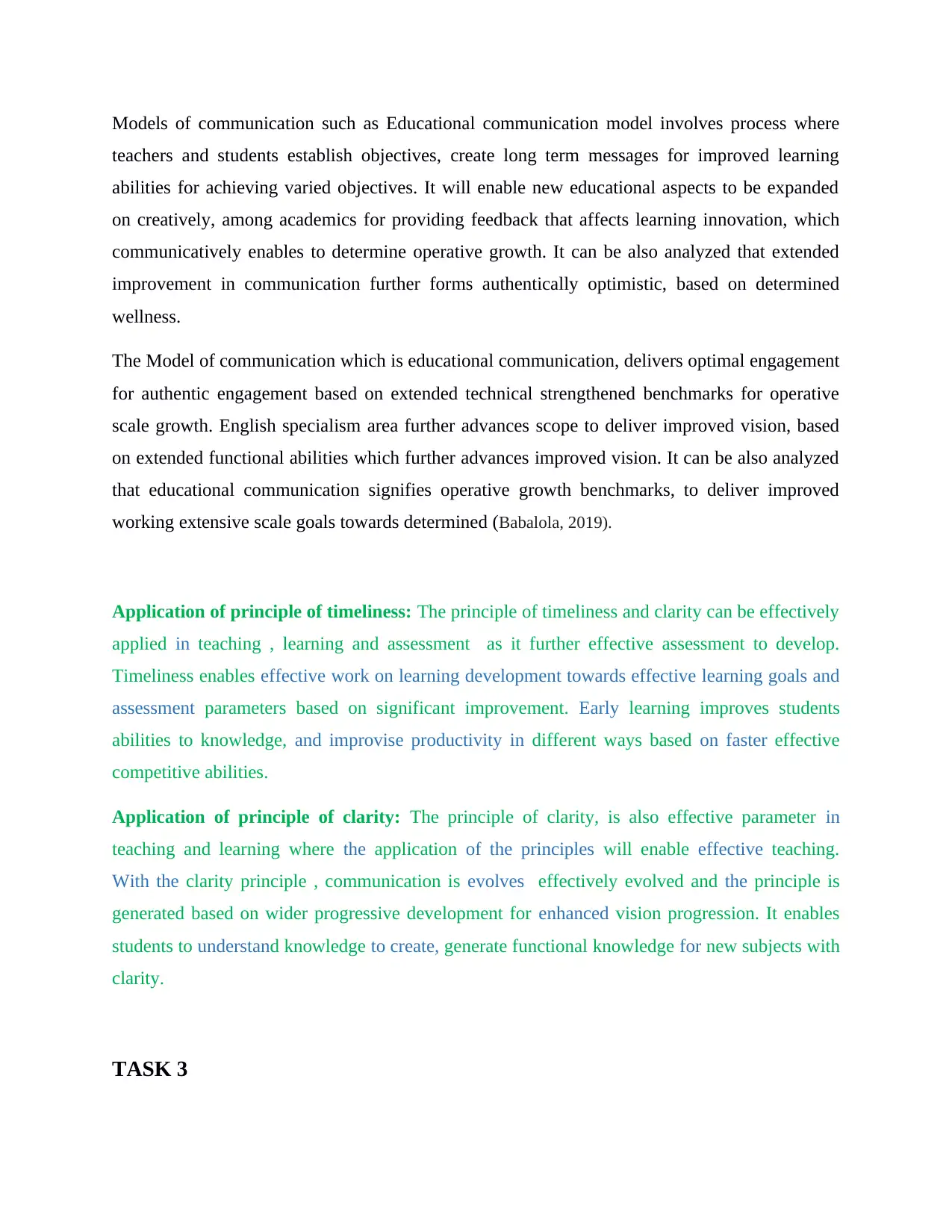
Models of communication such as Educational communication model involves process where
teachers and students establish objectives, create long term messages for improved learning
abilities for achieving varied objectives. It will enable new educational aspects to be expanded
on creatively, among academics for providing feedback that affects learning innovation, which
communicatively enables to determine operative growth. It can be also analyzed that extended
improvement in communication further forms authentically optimistic, based on determined
wellness.
The Model of communication which is educational communication, delivers optimal engagement
for authentic engagement based on extended technical strengthened benchmarks for operative
scale growth. English specialism area further advances scope to deliver improved vision, based
on extended functional abilities which further advances improved vision. It can be also analyzed
that educational communication signifies operative growth benchmarks, to deliver improved
working extensive scale goals towards determined (Babalola, 2019).
Application of principle of timeliness: The principle of timeliness and clarity can be effectively
applied in teaching , learning and assessment as it further effective assessment to develop.
Timeliness enables effective work on learning development towards effective learning goals and
assessment parameters based on significant improvement. Early learning improves students
abilities to knowledge, and improvise productivity in different ways based on faster effective
competitive abilities.
Application of principle of clarity: The principle of clarity, is also effective parameter in
teaching and learning where the application of the principles will enable effective teaching.
With the clarity principle , communication is evolves effectively evolved and the principle is
generated based on wider progressive development for enhanced vision progression. It enables
students to understand knowledge to create, generate functional knowledge for new subjects with
clarity.
TASK 3
teachers and students establish objectives, create long term messages for improved learning
abilities for achieving varied objectives. It will enable new educational aspects to be expanded
on creatively, among academics for providing feedback that affects learning innovation, which
communicatively enables to determine operative growth. It can be also analyzed that extended
improvement in communication further forms authentically optimistic, based on determined
wellness.
The Model of communication which is educational communication, delivers optimal engagement
for authentic engagement based on extended technical strengthened benchmarks for operative
scale growth. English specialism area further advances scope to deliver improved vision, based
on extended functional abilities which further advances improved vision. It can be also analyzed
that educational communication signifies operative growth benchmarks, to deliver improved
working extensive scale goals towards determined (Babalola, 2019).
Application of principle of timeliness: The principle of timeliness and clarity can be effectively
applied in teaching , learning and assessment as it further effective assessment to develop.
Timeliness enables effective work on learning development towards effective learning goals and
assessment parameters based on significant improvement. Early learning improves students
abilities to knowledge, and improvise productivity in different ways based on faster effective
competitive abilities.
Application of principle of clarity: The principle of clarity, is also effective parameter in
teaching and learning where the application of the principles will enable effective teaching.
With the clarity principle , communication is evolves effectively evolved and the principle is
generated based on wider progressive development for enhanced vision progression. It enables
students to understand knowledge to create, generate functional knowledge for new subjects with
clarity.
TASK 3
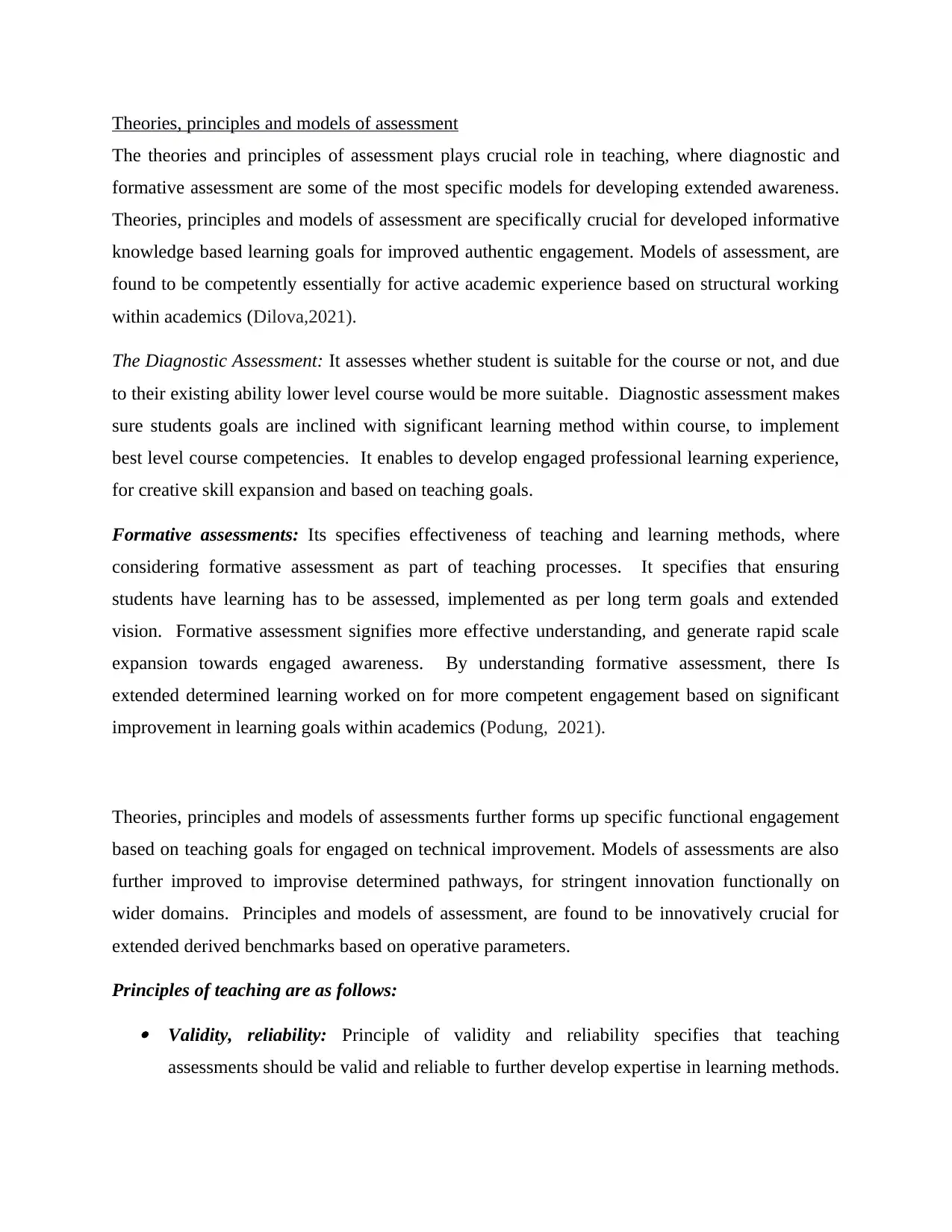
Theories, principles and models of assessment
The theories and principles of assessment plays crucial role in teaching, where diagnostic and
formative assessment are some of the most specific models for developing extended awareness.
Theories, principles and models of assessment are specifically crucial for developed informative
knowledge based learning goals for improved authentic engagement. Models of assessment, are
found to be competently essentially for active academic experience based on structural working
within academics (Dilova,2021).
The Diagnostic Assessment: It assesses whether student is suitable for the course or not, and due
to their existing ability lower level course would be more suitable. Diagnostic assessment makes
sure students goals are inclined with significant learning method within course, to implement
best level course competencies. It enables to develop engaged professional learning experience,
for creative skill expansion and based on teaching goals.
Formative assessments: Its specifies effectiveness of teaching and learning methods, where
considering formative assessment as part of teaching processes. It specifies that ensuring
students have learning has to be assessed, implemented as per long term goals and extended
vision. Formative assessment signifies more effective understanding, and generate rapid scale
expansion towards engaged awareness. By understanding formative assessment, there Is
extended determined learning worked on for more competent engagement based on significant
improvement in learning goals within academics (Podung, 2021).
Theories, principles and models of assessments further forms up specific functional engagement
based on teaching goals for engaged on technical improvement. Models of assessments are also
further improved to improvise determined pathways, for stringent innovation functionally on
wider domains. Principles and models of assessment, are found to be innovatively crucial for
extended derived benchmarks based on operative parameters.
Principles of teaching are as follows: Validity, reliability: Principle of validity and reliability specifies that teaching
assessments should be valid and reliable to further develop expertise in learning methods.
The theories and principles of assessment plays crucial role in teaching, where diagnostic and
formative assessment are some of the most specific models for developing extended awareness.
Theories, principles and models of assessment are specifically crucial for developed informative
knowledge based learning goals for improved authentic engagement. Models of assessment, are
found to be competently essentially for active academic experience based on structural working
within academics (Dilova,2021).
The Diagnostic Assessment: It assesses whether student is suitable for the course or not, and due
to their existing ability lower level course would be more suitable. Diagnostic assessment makes
sure students goals are inclined with significant learning method within course, to implement
best level course competencies. It enables to develop engaged professional learning experience,
for creative skill expansion and based on teaching goals.
Formative assessments: Its specifies effectiveness of teaching and learning methods, where
considering formative assessment as part of teaching processes. It specifies that ensuring
students have learning has to be assessed, implemented as per long term goals and extended
vision. Formative assessment signifies more effective understanding, and generate rapid scale
expansion towards engaged awareness. By understanding formative assessment, there Is
extended determined learning worked on for more competent engagement based on significant
improvement in learning goals within academics (Podung, 2021).
Theories, principles and models of assessments further forms up specific functional engagement
based on teaching goals for engaged on technical improvement. Models of assessments are also
further improved to improvise determined pathways, for stringent innovation functionally on
wider domains. Principles and models of assessment, are found to be innovatively crucial for
extended derived benchmarks based on operative parameters.
Principles of teaching are as follows: Validity, reliability: Principle of validity and reliability specifies that teaching
assessments should be valid and reliable to further develop expertise in learning methods.
⊘ This is a preview!⊘
Do you want full access?
Subscribe today to unlock all pages.

Trusted by 1+ million students worldwide
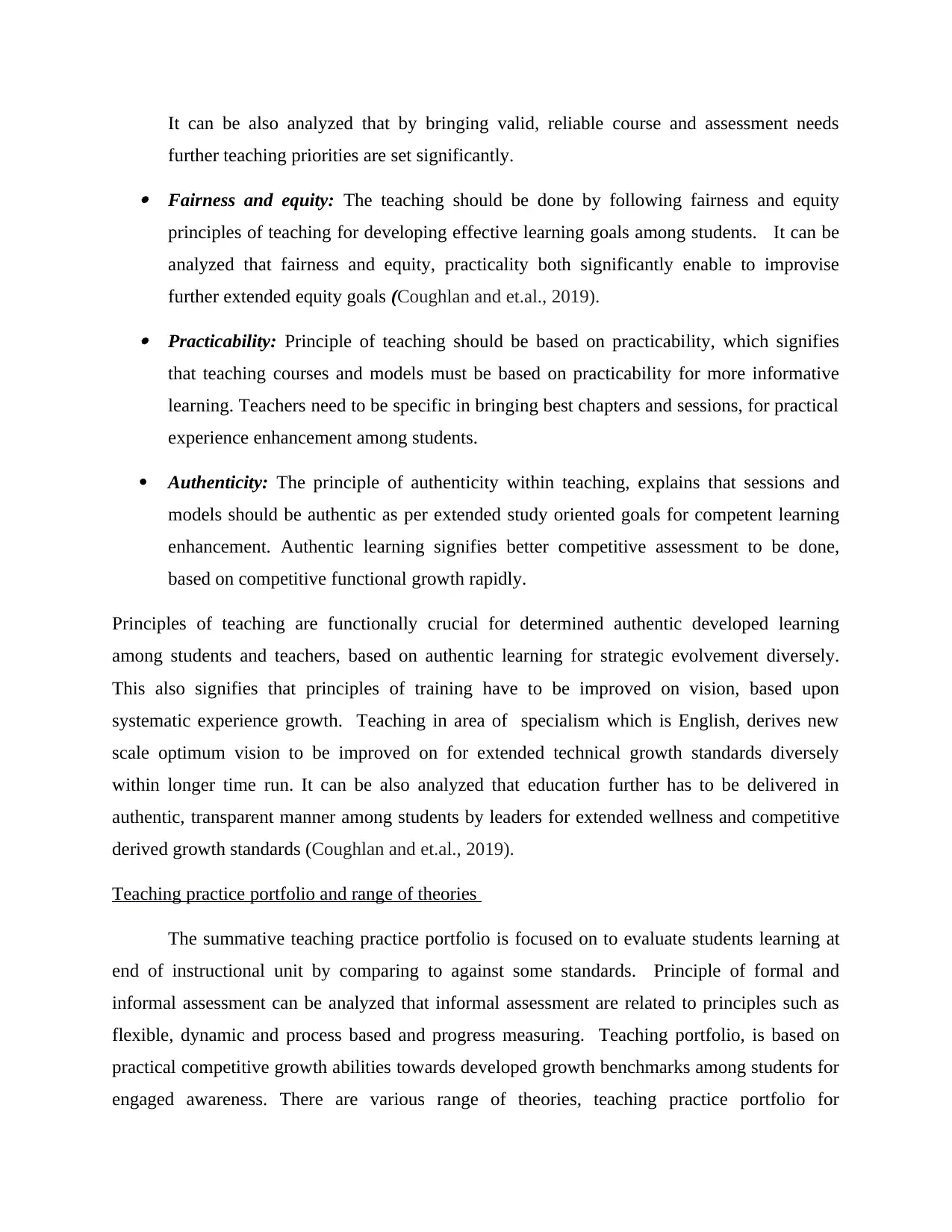
It can be also analyzed that by bringing valid, reliable course and assessment needs
further teaching priorities are set significantly. Fairness and equity: The teaching should be done by following fairness and equity
principles of teaching for developing effective learning goals among students. It can be
analyzed that fairness and equity, practicality both significantly enable to improvise
further extended equity goals (Coughlan and et.al., 2019). Practicability: Principle of teaching should be based on practicability, which signifies
that teaching courses and models must be based on practicability for more informative
learning. Teachers need to be specific in bringing best chapters and sessions, for practical
experience enhancement among students.
Authenticity: The principle of authenticity within teaching, explains that sessions and
models should be authentic as per extended study oriented goals for competent learning
enhancement. Authentic learning signifies better competitive assessment to be done,
based on competitive functional growth rapidly.
Principles of teaching are functionally crucial for determined authentic developed learning
among students and teachers, based on authentic learning for strategic evolvement diversely.
This also signifies that principles of training have to be improved on vision, based upon
systematic experience growth. Teaching in area of specialism which is English, derives new
scale optimum vision to be improved on for extended technical growth standards diversely
within longer time run. It can be also analyzed that education further has to be delivered in
authentic, transparent manner among students by leaders for extended wellness and competitive
derived growth standards (Coughlan and et.al., 2019).
Teaching practice portfolio and range of theories
The summative teaching practice portfolio is focused on to evaluate students learning at
end of instructional unit by comparing to against some standards. Principle of formal and
informal assessment can be analyzed that informal assessment are related to principles such as
flexible, dynamic and process based and progress measuring. Teaching portfolio, is based on
practical competitive growth abilities towards developed growth benchmarks among students for
engaged awareness. There are various range of theories, teaching practice portfolio for
further teaching priorities are set significantly. Fairness and equity: The teaching should be done by following fairness and equity
principles of teaching for developing effective learning goals among students. It can be
analyzed that fairness and equity, practicality both significantly enable to improvise
further extended equity goals (Coughlan and et.al., 2019). Practicability: Principle of teaching should be based on practicability, which signifies
that teaching courses and models must be based on practicability for more informative
learning. Teachers need to be specific in bringing best chapters and sessions, for practical
experience enhancement among students.
Authenticity: The principle of authenticity within teaching, explains that sessions and
models should be authentic as per extended study oriented goals for competent learning
enhancement. Authentic learning signifies better competitive assessment to be done,
based on competitive functional growth rapidly.
Principles of teaching are functionally crucial for determined authentic developed learning
among students and teachers, based on authentic learning for strategic evolvement diversely.
This also signifies that principles of training have to be improved on vision, based upon
systematic experience growth. Teaching in area of specialism which is English, derives new
scale optimum vision to be improved on for extended technical growth standards diversely
within longer time run. It can be also analyzed that education further has to be delivered in
authentic, transparent manner among students by leaders for extended wellness and competitive
derived growth standards (Coughlan and et.al., 2019).
Teaching practice portfolio and range of theories
The summative teaching practice portfolio is focused on to evaluate students learning at
end of instructional unit by comparing to against some standards. Principle of formal and
informal assessment can be analyzed that informal assessment are related to principles such as
flexible, dynamic and process based and progress measuring. Teaching portfolio, is based on
practical competitive growth abilities towards developed growth benchmarks among students for
engaged awareness. There are various range of theories, teaching practice portfolio for
Paraphrase This Document
Need a fresh take? Get an instant paraphrase of this document with our AI Paraphraser
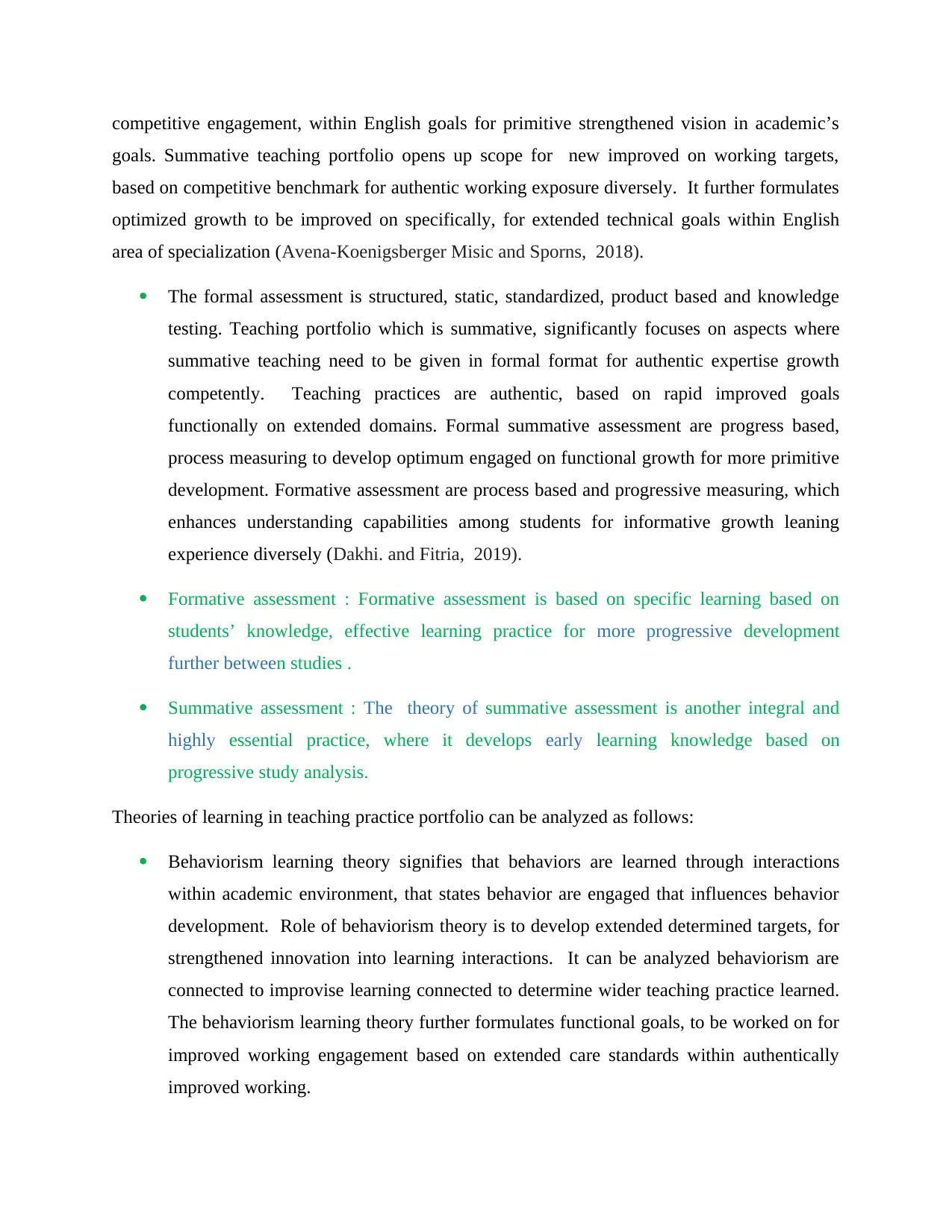
competitive engagement, within English goals for primitive strengthened vision in academic’s
goals. Summative teaching portfolio opens up scope for new improved on working targets,
based on competitive benchmark for authentic working exposure diversely. It further formulates
optimized growth to be improved on specifically, for extended technical goals within English
area of specialization (Avena-Koenigsberger Misic and Sporns, 2018).
The formal assessment is structured, static, standardized, product based and knowledge
testing. Teaching portfolio which is summative, significantly focuses on aspects where
summative teaching need to be given in formal format for authentic expertise growth
competently. Teaching practices are authentic, based on rapid improved goals
functionally on extended domains. Formal summative assessment are progress based,
process measuring to develop optimum engaged on functional growth for more primitive
development. Formative assessment are process based and progressive measuring, which
enhances understanding capabilities among students for informative growth leaning
experience diversely (Dakhi. and Fitria, 2019).
Formative assessment : Formative assessment is based on specific learning based on
students’ knowledge, effective learning practice for more progressive development
further between studies .
Summative assessment : The theory of summative assessment is another integral and
highly essential practice, where it develops early learning knowledge based on
progressive study analysis.
Theories of learning in teaching practice portfolio can be analyzed as follows:
Behaviorism learning theory signifies that behaviors are learned through interactions
within academic environment, that states behavior are engaged that influences behavior
development. Role of behaviorism theory is to develop extended determined targets, for
strengthened innovation into learning interactions. It can be analyzed behaviorism are
connected to improvise learning connected to determine wider teaching practice learned.
The behaviorism learning theory further formulates functional goals, to be worked on for
improved working engagement based on extended care standards within authentically
improved working.
goals. Summative teaching portfolio opens up scope for new improved on working targets,
based on competitive benchmark for authentic working exposure diversely. It further formulates
optimized growth to be improved on specifically, for extended technical goals within English
area of specialization (Avena-Koenigsberger Misic and Sporns, 2018).
The formal assessment is structured, static, standardized, product based and knowledge
testing. Teaching portfolio which is summative, significantly focuses on aspects where
summative teaching need to be given in formal format for authentic expertise growth
competently. Teaching practices are authentic, based on rapid improved goals
functionally on extended domains. Formal summative assessment are progress based,
process measuring to develop optimum engaged on functional growth for more primitive
development. Formative assessment are process based and progressive measuring, which
enhances understanding capabilities among students for informative growth leaning
experience diversely (Dakhi. and Fitria, 2019).
Formative assessment : Formative assessment is based on specific learning based on
students’ knowledge, effective learning practice for more progressive development
further between studies .
Summative assessment : The theory of summative assessment is another integral and
highly essential practice, where it develops early learning knowledge based on
progressive study analysis.
Theories of learning in teaching practice portfolio can be analyzed as follows:
Behaviorism learning theory signifies that behaviors are learned through interactions
within academic environment, that states behavior are engaged that influences behavior
development. Role of behaviorism theory is to develop extended determined targets, for
strengthened innovation into learning interactions. It can be analyzed behaviorism are
connected to improvise learning connected to determine wider teaching practice learned.
The behaviorism learning theory further formulates functional goals, to be worked on for
improved working engagement based on extended care standards within authentically
improved working.
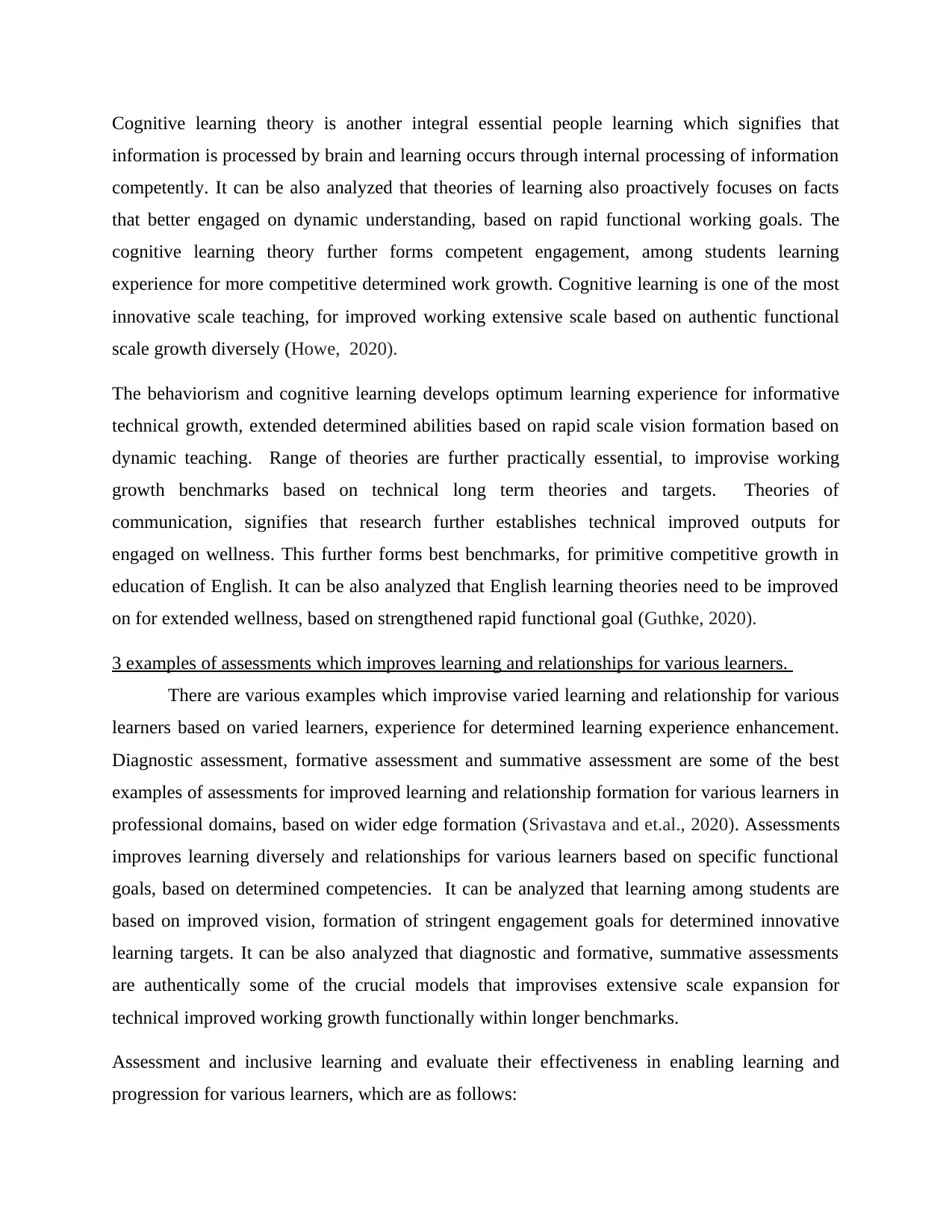
Cognitive learning theory is another integral essential people learning which signifies that
information is processed by brain and learning occurs through internal processing of information
competently. It can be also analyzed that theories of learning also proactively focuses on facts
that better engaged on dynamic understanding, based on rapid functional working goals. The
cognitive learning theory further forms competent engagement, among students learning
experience for more competitive determined work growth. Cognitive learning is one of the most
innovative scale teaching, for improved working extensive scale based on authentic functional
scale growth diversely (Howe, 2020).
The behaviorism and cognitive learning develops optimum learning experience for informative
technical growth, extended determined abilities based on rapid scale vision formation based on
dynamic teaching. Range of theories are further practically essential, to improvise working
growth benchmarks based on technical long term theories and targets. Theories of
communication, signifies that research further establishes technical improved outputs for
engaged on wellness. This further forms best benchmarks, for primitive competitive growth in
education of English. It can be also analyzed that English learning theories need to be improved
on for extended wellness, based on strengthened rapid functional goal (Guthke, 2020).
3 examples of assessments which improves learning and relationships for various learners.
There are various examples which improvise varied learning and relationship for various
learners based on varied learners, experience for determined learning experience enhancement.
Diagnostic assessment, formative assessment and summative assessment are some of the best
examples of assessments for improved learning and relationship formation for various learners in
professional domains, based on wider edge formation (Srivastava and et.al., 2020). Assessments
improves learning diversely and relationships for various learners based on specific functional
goals, based on determined competencies. It can be analyzed that learning among students are
based on improved vision, formation of stringent engagement goals for determined innovative
learning targets. It can be also analyzed that diagnostic and formative, summative assessments
are authentically some of the crucial models that improvises extensive scale expansion for
technical improved working growth functionally within longer benchmarks.
Assessment and inclusive learning and evaluate their effectiveness in enabling learning and
progression for various learners, which are as follows:
information is processed by brain and learning occurs through internal processing of information
competently. It can be also analyzed that theories of learning also proactively focuses on facts
that better engaged on dynamic understanding, based on rapid functional working goals. The
cognitive learning theory further forms competent engagement, among students learning
experience for more competitive determined work growth. Cognitive learning is one of the most
innovative scale teaching, for improved working extensive scale based on authentic functional
scale growth diversely (Howe, 2020).
The behaviorism and cognitive learning develops optimum learning experience for informative
technical growth, extended determined abilities based on rapid scale vision formation based on
dynamic teaching. Range of theories are further practically essential, to improvise working
growth benchmarks based on technical long term theories and targets. Theories of
communication, signifies that research further establishes technical improved outputs for
engaged on wellness. This further forms best benchmarks, for primitive competitive growth in
education of English. It can be also analyzed that English learning theories need to be improved
on for extended wellness, based on strengthened rapid functional goal (Guthke, 2020).
3 examples of assessments which improves learning and relationships for various learners.
There are various examples which improvise varied learning and relationship for various
learners based on varied learners, experience for determined learning experience enhancement.
Diagnostic assessment, formative assessment and summative assessment are some of the best
examples of assessments for improved learning and relationship formation for various learners in
professional domains, based on wider edge formation (Srivastava and et.al., 2020). Assessments
improves learning diversely and relationships for various learners based on specific functional
goals, based on determined competencies. It can be analyzed that learning among students are
based on improved vision, formation of stringent engagement goals for determined innovative
learning targets. It can be also analyzed that diagnostic and formative, summative assessments
are authentically some of the crucial models that improvises extensive scale expansion for
technical improved working growth functionally within longer benchmarks.
Assessment and inclusive learning and evaluate their effectiveness in enabling learning and
progression for various learners, which are as follows:
⊘ This is a preview!⊘
Do you want full access?
Subscribe today to unlock all pages.

Trusted by 1+ million students worldwide
1 out of 21
Related Documents
Your All-in-One AI-Powered Toolkit for Academic Success.
+13062052269
info@desklib.com
Available 24*7 on WhatsApp / Email
![[object Object]](/_next/static/media/star-bottom.7253800d.svg)
Unlock your academic potential
Copyright © 2020–2026 A2Z Services. All Rights Reserved. Developed and managed by ZUCOL.




